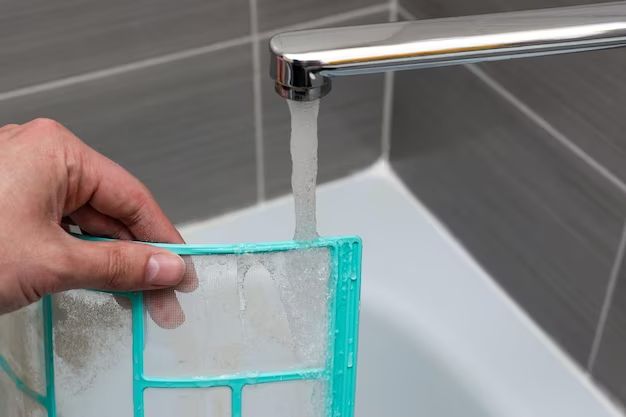Using a water filter on a pressure washer is certainly possible, but it requires some careful consideration. Pressure washers operate by taking water from a source, like a hose or bucket, and running it through a pump to increase the pressure. This high-pressure water is then ejected from the nozzle to clean surfaces. While tap water works fine for most cleaning tasks, in some situations filtered or softened water can improve the performance of a pressure washer.
Page Contents
Benefits of Using a Water Filter on a Pressure Washer
There are a few potential benefits to using filtered water in a pressure washer:
- Remove minerals and sediment – Tap water often contains dissolved minerals like calcium and magnesium. These minerals can build up and clog components in the pressure washer over time. A water filter can remove these minerals and sediment, helping prevent scale build-up.
- Prevent spotting – Minerals in tap water will often leave behind white mineral deposits or spots on surfaces after they dry. Using filtered water can prevent these cosmetic spotting issues.
- Improve cleaning performance – Softened or filtered water has fewer dissolved solids. This allows detergents and cleaning agents to work more effectively.
- Extend equipment life – Removing abrasive particles and minerals from the water can help reduce wear and tear on the internal components of the pressure washer.
Considerations When Adding a Filter to a Pressure Washer
While filtering wash water can provide benefits, there are some important factors to consider:
- Water flow rate – Pressure washers require a high flow rate to operate properly. The filter system must be sized appropriately to accommodate the gallons per minute (GPM) of the pressure washer pump without restricting flow.
- Operating pressure – Pressure washers often operate at 1000+ PSI. The filter system components must be rated to safely handle these high pressures.
- Filter maintenance – Filters will need to be replaced or cleaned regularly to remain effective. This adds a periodic maintenance requirement.
- Filter location – The filter will need to be installed in the water supply line before the pump inlet. This often requires some plumbing modifications.
- Cost – Quality water filtration systems can be quite expensive. The costs of installation and maintenance must be factored in.
Types of Water Filters for Pressure Washers
There are several types of water filters that can be used with pressure washers:
- Sediment filter – This basic filter uses a strainer to remove sand, silt, grit, and other particles from the water. It does not remove dissolved minerals.
- Carbon filter – Carbon filters use activated carbon to remove some dissolved contaminants like chlorine. They do not soften the water or remove minerals.
- Reverse osmosis – RO systems force water through a semi-permeable membrane to remove minerals and impurities. They are the most thorough filtration option but also the most expensive.
- Water softener – These systems exchange hardness minerals like calcium and magnesium for sodium ions. This reduces mineral build-up but does not remove many other impurities.
The best type of filter to use depends on the water quality and the specific contaminants that need to be removed.
How to Install a Filter on a Pressure Washer
Here are the basic steps for installing a water filter on a pressure washer:
- Obtain all necessary filtration components – This includes the filter housing, filter cartridge, fittings and tubing.
- Shut off water supply and depressurize washer.
- Disconnect the water supply hose from the pressure washer inlet.
- Install the filter housing assembly in the supply line before the pressure washer inlet.
- Connect all tubing and fittings.
- Turn on water supply and check for leaks.
- Run the pressure washer and inspect filter function.
- Flush filter for 30 minutes prior to first use.
A sediment separator is often installed before the filter to help prolong filter life. All installation instructions provided with the filter system must be followed.
Filter Selection Criteria
To select an appropriate water filter for a pressure washer, the following criteria should be considered:
| Criteria | Importance |
|---|---|
| Flow rate capacity | Extremely important – must match pressure washer GPM |
| Maximum operating pressure | Very important – must handle pressure washer PSI |
| Filtration media/techology | Somewhat important – depends on contaminants present |
| Micron rating | Somewhat important – depends on particle sizes to remove |
| Cost | Somewhat important – balances performance with affordability |
| Maintenance requirements | Somewhat important – cartridge changes, cleaning, etc. |
Selecting a filter rated for the correct flow and pressure is critical. The micron rating, filtration media and capacity then depend on the specific water conditions and contaminants present.
Example Filter Selection
For a pressure washer with the following specifications:
- 2600 PSI
- 2.5 GPM flow rate
- Used with well water containing some sediment
- Goal is to remove particles and extend pump life
A suitable filter option would be:
| Filter Criteria | Selection |
|---|---|
| Type | 10 micron sediment filter |
| Max Pressure | 4000 PSI rating |
| Flow Rate | 5 GPM capacity |
| Housing | Plastic housing with 1″ ports |
| Cost | $50 |
This 10 micron sediment filter can effectively remove grit and sand particles while handling the pressure and flow rate needs for less than $100. The plastic housing makes installation easier.
Conclusion
Adding a water filter to a pressure washer can certainly be beneficial in many circumstances. It can improve cleaning performance, reduce equipment wear, and prevent spotting or residue on cleaned surfaces. However, care must be taken to select a filter rated for the high pressures and flow rates involved. The filtration system must also be installed properly before the pump inlet. While the upfront and maintenance costs add expense, filtered water may be worth it for those applications where water quality is an issue.
